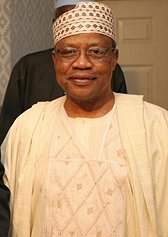Ibrahim Babangida
Major General Ibrahim Badamasi Babangida (born August 17, 1941 in Minna ) or IBB for short was Nigeria's military dictator from 1985 to 1993 .
Life
After joining the Nigerian armed forces in 1962, Babangida completed an officer career. He was u. a. trained at the Kaduna Military Academy as well as in India, Great Britain and the USA. 1964 to 1966 troop commander, 1970 to 1972 major and head of the institute of the Kaduna Military Academy. From 1975 to 1979 he was a member of the Supreme Military Council in the first government of Olusegun Obasanjo ; he held the same position from 1983 to 1985 under the military dictator Muhammadu Buhari . Under Presidents Obasanjo and Buhari, he continued to take on the following positions: 1977 after graduating from the staff college, commander of the tank corps, 1979 promotion to brigadier general, 1981 director for planning and tasks of the army staff and chief of staff. After the coup of December 31, 1983 and the overthrow of the civil government of Shehu Shagari , he became the army commander in chief.
president
General Babangida ruled the Federal Republic of Nigeria from August 27, 1985 until his resignation on August 27, 1993, exactly 8 years to the day.
Palace coup against the Buhari government
On August 27, 1985, Babangida came to power in a bloodless coup against President Buhari and became head of state himself. He entered with the promise to end the human rights abuses committed by the Buhari government and to hand over power to a civilian government in 1990. After an initially rather liberal policy, his regime was marked by increasing repression and massive corruption with a massive loss of legitimacy. His regime was subsequently also linked to massive human rights abuses and political murders. A democratization process initiated by Babangida to found a III. Republic ended in failure.
Attempted coup in 1990
On April 22, 1990, Babangida survived an attempted coup led by Major Gideon Orkar . Rebels attacked the Dodan Barracks in Lagos , the military headquarters and residence of the president. Babangida, who was there at the time, managed to escape. The guards overwhelmed the attackers. Five members of the presidential guard were killed.
1993 presidential election
Local elections were held in 1990 and parliamentary elections in 1992 as part of the return to civilian government program. Elections for a civilian president were held in June 1993. It was the first presidential election since the military coup. Moshood Abiola of the Social Democratic Party, which emerged as the winner of the election, had previously been selected by Babangida to be the top candidate for one of the two parties that were to replace the military dictatorship with a civil system. Abiola prevailed with 58% to 41% against the candidate of the National Republican Convention, Bashir Tofa. Although the election was widely considered free and democratic, it was canceled by General Babangida. This cancellation "is one of the issues we have to live with" and that "Nigerians would one day forgive our regime for this," Babangida said in a statement. After the cancellation of the elections, the regime began with massive and insidious propaganda, with which it deepened the distrust between the ethnic groups, but also within the individual ethnic groups.
resignation
In the summer of 1993 there were increased public protests against the Babangida regime. At the end of August 1993 there were widespread protests and strikes , which paralyzed large parts of the Nigerian economy. Due to increasing public pressure, Babaginda finally resigned on August 27 and handed the government over to a short-lived transitional government under the leadership of Ernest Shonekan , which had to give way to the dictatorship of General Sani Abacha only three months after taking over the government .
Human rights violations and allegations of corruption
General Babangida's regime was charged with massive human rights violations during his presidency. In 1999 the then Nigerian President Olusegun Obasanjo established the Human Rights Violation Investigation Commission. The commission was tasked with investigating human rights violations during the decades of military dictatorship in Nigeria. The former president denied allegations of corruption and involvement in the 1986 murder of Newswatch weekly newspaper editor Dele Giwa.
Life After the Presidency
As a result, Babangida initially largely withdrew from politics, but has been increasingly politically active again since the beginning of the IV Republic from 1999. After being traded as a possible presidential candidate several times, he declared his candidacy for the 2011 presidential election in April 2010.
Web links
- Library of Congress Country Studies : Nigeria - The Babangida Government
- Gideon Orkar's 1990 speech
- Palace Coup August 1985
- ibrahim babangida
| personal data | |
|---|---|
| SURNAME | Babangida, Ibrahim |
| ALTERNATIVE NAMES | Babangida, Ibrahim Badamasi (full name) |
| BRIEF DESCRIPTION | Nigerian officer, politician, and President of Nigeria |
| DATE OF BIRTH | August 17, 1941 |
| PLACE OF BIRTH | Minna |

